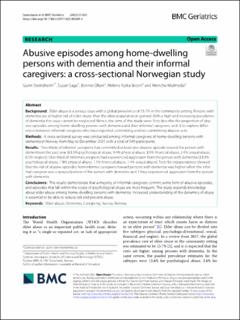| dc.contributor.author | Steinsheim, Gunn | |
| dc.contributor.author | Saga, Susan | |
| dc.contributor.author | Olsen, Bonnie | |
| dc.contributor.author | Broen, Helene Kjeka | |
| dc.contributor.author | Malmedal, Wenche Karin | |
| dc.date.accessioned | 2023-02-07T12:15:45Z | |
| dc.date.available | 2023-02-07T12:15:45Z | |
| dc.date.created | 2022-11-16T09:05:46Z | |
| dc.date.issued | 2022 | |
| dc.identifier.issn | 1471-2318 | |
| dc.identifier.uri | https://hdl.handle.net/11250/3048878 | |
| dc.description.abstract | Background: Elder abuse is a serious issue with a global prevalence of 15.7% in the community setting. Persons with dementia are at higher risk of elder abuse than the older population in general. With a high and increasing prevalence of dementia this issue cannot be neglected. Hence, the aims of this study were 1) to describe the proportion of abusive episodes among home-dwelling persons with dementia and their informal caregivers, and 2) to explore differences between informal caregivers who have reported committing and not committing abusive acts. Methods: A cross-sectional survey was conducted among informal caregivers of home-dwelling persons with dementia in Norway from May to December 2021 with a total of 549 participants. Results: Two-thirds of informal caregivers had committed at least one abusive episode toward the person with dementia in the past year (63.5% psychological abuse, 9.4% physical abuse, 3.9% financial abuse, 2.4% sexual abuse, 6.5% neglect). One-third of informal caregivers had experienced aggression from the person with dementia (33.9% psychological abuse, 7.8% physical abuse, 1.1% financial abuse, 1.4% sexual abuse). Tests for independence showed that the risk of abusive episodes from informal caregivers toward persons with dementia was higher when the informal caregiver was a spouse/partner of the person with dementia and if they experienced aggression from the person with dementia. Conclusions: The results demonstrate that a majority of informal caregivers commit some form of abusive episodes, and episodes that fall within the scope of psychological abuse are most frequent. This study expands knowledge about elder abuse among home-dwelling persons with dementia. Increased understanding of the dynamics of abuse is essential to be able to reduce risk and prevent abuse. | en_US |
| dc.description.abstract | Abusive episodes among home-dwelling persons with dementia and their informal caregivers: a cross-sectional Norwegian study | en_US |
| dc.language.iso | eng | en_US |
| dc.publisher | BioMed Central | en_US |
| dc.rights | Navngivelse 4.0 Internasjonal | * |
| dc.rights.uri | http://creativecommons.org/licenses/by/4.0/deed.no | * |
| dc.subject | Vold og overgrep blant eldre | en_US |
| dc.subject | Elder abuse | en_US |
| dc.subject | Demens | en_US |
| dc.subject | Dementia | en_US |
| dc.subject | Pårørende | en_US |
| dc.subject | Next of kin | en_US |
| dc.subject | Spørreundersøkelse | en_US |
| dc.subject | Survey | en_US |
| dc.title | Abusive episodes among home-dwelling persons with dementia and their informal caregivers: a cross-sectional Norwegian study | en_US |
| dc.title.alternative | Abusive episodes among home-dwelling persons with dementia and their informal caregivers: a cross-sectional Norwegian study | en_US |
| dc.type | Peer reviewed | en_US |
| dc.type | Journal article | en_US |
| dc.description.version | publishedVersion | en_US |
| dc.source.volume | 22 | en_US |
| dc.source.journal | BMC Geriatrics | en_US |
| dc.source.issue | 1 | en_US |
| dc.identifier.doi | 10.1186/s12877-022-03569-4 | |
| dc.identifier.cristin | 2074599 | |
| cristin.ispublished | true | |
| cristin.fulltext | original | |
| cristin.qualitycode | 1 | |

